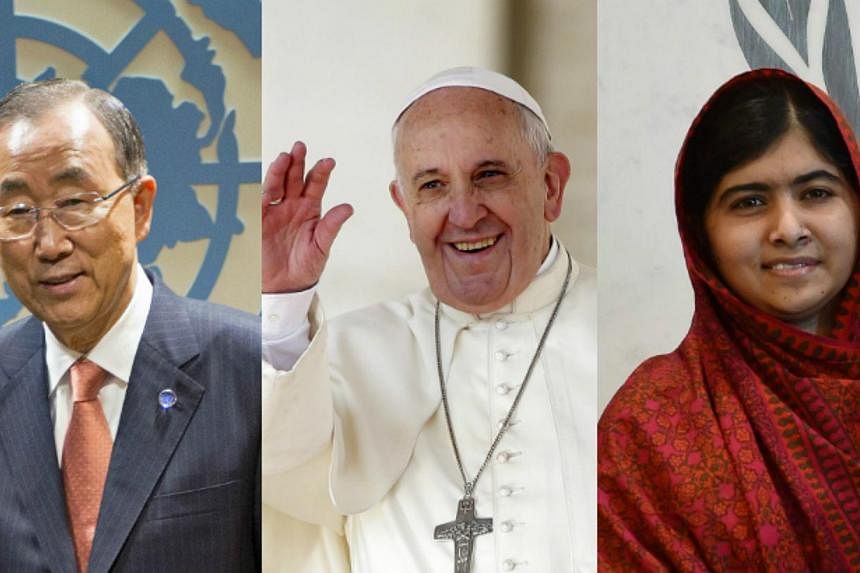Every October, the guessing game begins on who will win the Nobel Peace Prize, one of the most unpredictable and sometimes controversial accolades.
First awarded in 1901, it was introduced by Swedish chemist and innovator Alfred Nobel to honour those who "have done the most or the best work for fraternity between nations, for the abolition or reduction of standing armies and for the holding and promotion of peace congresses".
Previous laureates include United States president Barack Obama, missionary Mother Teresa, African-American civil rights leader Martin Luther King Jr, Red Cross founder Jean Henry Dunant, Burmese opposition leader Aung San Suu Kyi and former Soviet Union president Mikhail Gorbachev.
This year, the Nobel Peace Prize committee received 278 nominations, a record number of contenders.
With the winner due to be announced on Friday, Oct 10, we look at some of those touted to snag the S$1.4 million award.
1. Edward Snowden

NSA whistleblower Edward Snowden in a June 6, 2013, file picture from a video of an interview with The Guardian in a hotel room in Hong
Kong. -- PHOTO: REUTERS
Who he is: Former US intelligence analyst
Why he might win: The former National Security Agency analyst leaked classified information and exposed the extent of the US government's global eavesdropping. While some consider the 31-year-old a traitor, others have hailed him as a hero, applauding his bravery for exposing the methods of American intelligence agencies.
Last month he shared the Right Livelihood Award, also known as the "alternative Nobel Peace Prize", with others such as British journalist and editor of The Guardian newspaper, Alan Rusbridger, and Pakistani human rights lawyer, Asma Jahangir.
2. Pope Francis

Pope Francis waves as he leads his weekly audience in Saint Peter's Square at the Vatican Oct 8, 2014. -- PHOTO: REUTERS
Who he is: Born Jorge Mario Bergoglio in Argentina, he is the first Latin American to lead the Roman Catholic Church.
Why he might win: Since being elected in March last year after the resignation of Benedict XVI, the 77-year-old's empathy towards the disenfranchised has earned him fans around the world. Francis has spoken out against poverty, and his reign, unlike his predecessors', has been characterised by less indulgent standards, making him appear more relatable to the masses.
He has repeatedly called for peace in conflict zones such as Ukraine, Syria and Iraq, and urged reconciliation between the Israelis and the Palestinians.
During an address in St Peter's Square in the Vatican City in July, he deviated from a prepared speech to call for world peace. "Please stop, I ask you with all my heart, it's time to stop. Stop, please," he said. "Brothers and sisters, never war, never war!"
The "rock star" Pope - who made the cover of Rolling Stone magazine, was dubbed Esquire's Best Dressed Man last year, and even named Person of the Year by US gay magazine The Advocate for his seemingly open attitude towards homosexuality - has in many ways breathed new life into the Vatican.
3. Ban Ki Moon

United Nations (UN) Secretary-General Ban Ki Moon addresses a high-level summit on strengthening international peace operations during
the 69th session of the UN General Assembly at UN headquarters in New York on Sept 26, 2014. -- PHOTO:REUTERS
Who he is: The current United Nations secretary-general from South Korea.
Why he might win: As the UN's eighth chief since 2007, he has used his position to prioritise climate change, pandemics, food security and other pressing global challenges.
The 70-year-old once said of his determination to advance peace: "I grew up in war and saw the United Nations help my country to recover and rebuild...As Secretary-General, I am determined to see this Organisation deliver tangible, meaningful results that advance peace, development and human rights."
4. Malala Yousafzai

Malala Yousafzai addresses the first Global Citizenship Commission, at the University of Edinburgh in Scotland on Oct 19, 2013. -- PHOTO: AFP
Who she is: A Pakistani teenager who advocates for girls' education
Why she might win: The brave 17-year-old became a symbol of triumph over adversity when she survived getting shot in the head by the Taliban in 2012. The gunmen intended the attack as punishment for her high-profile campaign to encourage girls to go to school.
On her 16th birthday last year, she spoke at the United Nations, calling for worldwide access to education. UN secretary-general and fellow contender Ban Ki Moon described her as "our hero".
Nobeliana.com, a website run by Norwegian Nobel historians, has ranked her as their top candidate for the prize.
5. Novaya Gazeta
What it is: An independent Russian newspaper
Why it might win: One of the few independent media voices remaining in Russia alongside the likes of radio station Echo of Moscow and TV station Dozhd, the pro-democracy newspaper is known for its critical and investigative coverage.
It has had four of its journalists murdered since 2001. Among them was Anna Politkovskaya, whose reporting exposed multiple instances of human rights abuses in Chechnya.
Co-founded by former Soviet Union president Mikhail Gorbachev in 1993 with part of his Peace Prize money, the paper nonetheless continues to criticise the Kremlin despite president Vladimir Putin's tight state security apparatus.
In 2010, the publication won the Four Freedoms Award for Freedom of Speech.
6. Japanese People Who Conserve Article 9
What it is: A pacifist group in Japan
Why it might win: This group of citizens is committed to preserving a clause in Japan's constitution that prohibits war. The pacifist clause, drawn up after World War II, states that Japan will "forever renounce war" and the "threat or use of force as means of settling international disputes".
But Prime Minister Shinzo Abe's administration has ambitions to ease restrictions on Japan's use of force, and the Japanese government's reinterpretation of Article 9 earlier this year sparked public backlash. A large part of the population argues that the clause is one reason why the country has not waged war in almost 70 years.
Kristian Berg Harpviken, director of the Peace Research Institute Oslo (PRIO), a leading Peace Prize analyst, has placed the group in first place for his predictions.
Although he has yet to accurately forecast a winner in this category, he wrote of the Japanese group in his online shortlist: "We may have come to think of wars between states as virtually extinct after the end of the Cold War, but events in Ukraine and simmering tensions in East Asia remind us they may reappear, and a return to a principle often hailed in earlier periods of the Peace Prize would be well timed."
7. Denis Mukwege
Who he is: A doctor in the Democratic Republic of Congo
Why he might win: The gynaecologist has treated thousands of women who were gang-raped and tortured during his country's civil war, and is one of the world's foremost experts on how to repair internal physical damage caused by gang rape.
He founded a hospital in the Congo for victims of sexual violence. Together with his colleagues, he has treated more than 30,000 rape victims. In 2012, he gave a strong speech condemning mass rape in the Congo, and openly criticised the international community for failing to act.
Despite fleeing to Europe after an attempted assasination by four armed men in his home, he has returned home to continue treating his patients.
Four controversial Nobel Peace Prize winners
1. European Union (2012)
What it is: Politico-economic union of 28 member states
Why it won: "For over six decades contributed to the advancement of peace and reconciliation, democracy and human rights in Europe"
Why its win was controversial: The win came despite ongoing protests and riots in Greece, Portugal and Spain, in what the Associated Press dubbed the union's most severe internal crisis ever.
2. Liu Xiaobo (2010)
Who he is: Chinese dissident and political prisoner
Why he won: "For his long and non-violent struggle for fundamental human rights in China"
Why his win was controversial: Honouring Mr Liu's political agitation angered the Chinese government and damaged diplomatic and trade ties between Norway and China.
In an attempt to mend relations, Norwegian politicians refused to meet Tibetan spiritual leader, the Dalai Lama, another Peace Prize Laureate whom China deems an anti-government dissident. This in turn drew criticism from Norway's human rights community and cast doubt on the country's global image as a neutral arbiter.
3. Barack Obama (2009)

US President Barack Obama, delivers a speech after receiving the Nobel Peace Prize, during a ceremony in Oslo, Norway, on Dec 10, 2009. -- PHOTO: BLOOMBERG
Who he is: Current president of the United States
Why he won: "For his extraordinary efforts to strengthen international diplomacy and cooperation between peoples"
Why his win was controversial: Mr Obama was nominated for the prize less than two weeks after taking office, and won just months into his first term. Many accused the Nobel committee of being politically motivated.
America's first black president said then that he did not deserve the award, and many like Fox News journalist Kirsten Powers now agree with him, given his role in the Middle East drone war which has claimed up to 800 lives, and the escalation of the war in Afghanistan.
4. Yasser Arafat (1994)

Palestinian leader Yasser Arafat reads a statement addressed to the committee of the Nobel Peace Prize from his office in the West Bank town of Ramallah, on Dec 9, 2001. -- PHOTO: AFP
Who he is: Former chairman of the Palestine Liberation Organisation (PLO) and president of the Palestinian National Authority (PNA)
Why he won: "For (his) efforts to create peace in the Middle East"
Why his win was controversial: He was given the award alongside Israeli Prime Minister Yitzhak Rabin and his foreign minister Shimon Peres for the trio's work on the Oslo Peace Accords.
Time magazine reported that his supporters compared him to Nelson Mandela, while detractors called him an "unrepentant terrorist with a long legacy of promoting violence" in the form of terrorist campaigns against Israel.
Mr Arafat, whom many labelled a "monster" and "father of modern terrorism", has also been implicated in overseeing military groups responsible for bombings, hijackings, assassinations and even in the murder of 11 Israeli Olympic athletes.
Norwegian Nobel committee member Kaare Kristiansen resigned as a sign of protest against Mr Arafat's win.
Sources: AFP, edition.cnn.com, telegraph.co.uk, nobelprize.org, japantimes.co.jp, wallstcheatsheet.com, theweek.co.uk, america.aljazeera.com, prio.org


